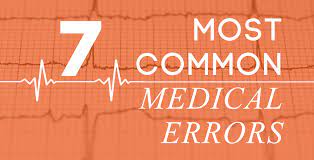What are the most frequent GP errors There are few experts who are as respected as GPs. In this important position it is essential to ensure that you’re providing the most effective advice and treatment. However, errors can happen and could be costly for the patient and for your professional career. Prescription errors are among the most frequent, and research has discovered that 8.9 errors per 100 medication prescriptions have been found therefore it is crucial that you are aware mistakes and take steps to prevent errors.
- Communication breakdown
- Prescribing to someone with an Allergy Known
- prescribing an incorrect drug Wrong Drug
- No Dosage
- The absence of monitoring
Communication breakdown
Most often, errors by GPs can be the result of an issue with communication with the physician and patient. This is the reason it is vital for GPs to ensure that they communicate effectively and develop their communication abilities when needed. In addition, you must write down information in writing to enable people to keep them in mind when they are at home.
So, what are few of the most frequent GP mistakes?
Prescriptions to a Person with an Allergy Known
A frequent and risky error is to prescribe a medication for someone with an allergy. Patients are not always able to provide complete histories. This is why it is crucial to verify a patient’s medical record prior to prescribing, to make sure you’re giving them the medication they’re non-allergic to.
Prescription of for the Wrong Drug
Prescription of the wrong drug is a common issue and is easy to correct if you pay more focus on the details. Most often, it is an outcome of selecting the wrong medication from an option menu on the computer or selecting the incorrect method of administration. It is possible to avoid this by making sure you take your time and double-check before releasing the patient.
False Dosage
The wrong dosage is another frequently occurring and risky error that is committed – it is particularly hazardous for children or older patients that require a lesser dosage. Also, paying attention to the finer points and double-checking is essential.
The absence of monitoring
GPs are juggling a lot of work and it is crucial to remember the importance of monitoring your patients to ensure that your patients are receiving the prescribed medication and/or medical treatment in a timely manner. Dr. negligence cases may arise when there is an rise of patients, which is why it’s essential for doctors to make sure that all patients are receiving the best quality of care, not only in the office of the doctor (or on the internet) but following their appointment too.
As as a GP As a GP, you must strive to offer the best quality of service. It is important to be aware of the mistakes you make and the best way to avoid them.
